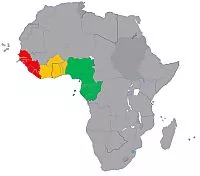As France goes to the ballot box today to choose between 39-year old centrist Emmanuel Macron of En Marche and France's potential first female leader, Marine Le Pen of the far –right Le Front National, how will the outcome affect France's relationship with L'Afrique?
Le French Connection
Cultural, historic, social, security and economic ties are just some of the key ways in which Franco-African relations continue to be bound together. In an interview with Le Monde, Macron emphasised the importance of African-French relations, underscoring that some 10% of the French population has African origins and that 300,000 French citizens live in France1. His acknowledgement of the importance of this relationship was pronounced in his campaign strategy on the continent, which included a visit to Algeria and the setting up of representative offices in around 15 African countries, both Francophone and non-Francophone. These included DRC, Kenya, Cote d'Ivoire and South Africa among others2. Le Pen also visited the continent during her campaigns, choosing to visit French troops fighting radical Islamic groupings in Chad3.
While France's dominance in Africa may have been dismantled at one level through decolonisation, the 'Francafrique' notion - which describes the influence that France exerts over its former African colonies through an intricate web of personal ties with the elites –still persists. Guinea's president Alpha Conde once said "We are still closely associated with former colonial power. Let's cut the umbilical cord4".
When it comes to discussing historical ties, Le Pen told Le Monde in an interview that France has nothing to apologise for in relation to its colonial past. Indeed, it was this sort of attitude which led to the plummeting of former president Nicholas Sarkozy's likeability factor during a visit to Senegal back in 20075. Macron's message has been mixed, on the one hand saying on a campaign visit to Algeria that "We must face up to this part of our history and apologize to those who were at the receiving end," but then on the other saying that he does not subscribe to 'repentance' but at the same time does not wish to erase history6, arguably a volte face following pressure back at home.
Fair Trading?
In terms of trade and investment, the two currency unions that France has on the continent through the Central African Economic Monetary Community (CEMAC) and the West African Economic and Monetary Union (UEMOA) will be in doubt if Le Pen comes to power. She has advocated for the removal of the CFA which is pegged to the Euro which has helped to insulate African economies of these unions from extreme currency swings. But France also benefits from the arrangement, where reserves from the 15 African nations who are part of the currency unions, are kept at the French Central Bank.
Traditionally, France's relations with the continent have been strong, with household names such as oil firm Total, port operator Bollore, construction firm Bouyges and telco Orange, part of the fabric of the investment climate on the continent. However, the commodity price slump, coupled with increased competition for contracts and resources from cross-border investors from places like China, means that France's position cannot be taken for granted. Indeed, the recent controversy surrounding French nuclear firm Areva in its bribery of government officials according to an investigation by Niger's parliament, is not only reputationally damaging for the firm but could arguably cast a shadow over broader French-African business dealings7.
Both Macron and Le Pen see the growth potential in Africa and both are likely to push for greater trade and investment with the continent. In the next ten years, French investments are expected to grow by 75%8 . Having spent some time in Nigeria during his studies at L'Ecole Nationale de l'Administration (l'ENA), Macron says he would be keen to capitalise upon the continent's burgeoning middle class and a dynamic private sector9 ". Le Pen also sees that the continent has 'considerable potential' through its natural resources and population growth particularly that of the youth. Were she to come to power, the emphasis would be placed upon education, agriculture and security she says.
Keeping it Safe
In terms of security, there are currently 9000 French troops stationed on the continent and this heavy military presence has come at a price. Macron has said that he would review political and military bases, and has placed emphasis on the need for African leaders to take full responsibility of their internal security affairs. With tensions still under the surface in Central African Republic and the lack of a definitive defeat of the terrorist actors in the Maghreb (home to many French commercial interests), an end to all military interventions could be counterproductive.
Looking past conflict to the role of democracy, Macon has stated his desire to make sure France plays a major role in supporting the democracy of African states. However, he also places a heavy emphasis on an African leadership of democratic standards. "I will uphold basic democratic principles throughout Africa, in tandem with the African Union and regional organisations that have a major role to play in upholding these principles of good democratic governance that African states have defined10."
To Aid or Not to Aid?
Development assistance is currently at 0.34% of GDP, an allocation which Le Pen laments and which she vows to build upon and increase to 0.7%. She has drawn parallels between the need to do this as a means of tackling the root cause of immigration: Africans must have a reason to stay in their home countries. Macron would also like to see this rise, but has made the 0.7% goal more of a medium term endeavor- between 2022 and 2030- depending on revenue. But the point of departure between the two candidates is perhaps most clear in Le Pen's claim that she would erase the 'droit du sol' arrangement, which grants French nationality to those who are born in France, bring an end to naturalisation through marriage and place a cap on immigration at 10,000 per year.
Outlook:
In terms of what will happen in the next round, we can expect that French voters in Africa will again massively back Macron. A French citizen of African origin in an interview with Songhai said, "we weren't too bothered about the elections before, but now we all have to come out and vote to make sure we don't end up with Le Pen as president, that would be disastrous for France and French Africans."
Le Pen will find herself in something of a quandary if victorious. She is an advocate of the abolition of the West African CFA Franc which is pegged to the euro. She is also aiming to take France out of both the European Union and the Eurozone, a move which would diminish her influence in what happens regarding the CFA. The potential effects of such a withdrawal would be very far-reaching with implications for the West African Central bank and the West African Economic Monetary Union that finance many development projects across the region.
A Macron victory would likely result in less pronounced change to the status quo than if Le Pen were to assume power. His stance on altering the nature of military interventions will certainly be an area to watch closely: indeed, an end to all military interventions could be counterproductive.
Regardless of the eventual victor, there is likely to be some form of reform in the Francafrique relationship due to neither of the two candidates coming from either of France's two main parties. The bond has been built on decades of personal relationship and these will have to be reformed with two figures far removed from the norms of the established elites of French and African politics. In theory, at least, this should translate into greater transparency, a levelling of the playing field and more competition accompanied by higher standards- when it comes to doing business on the continent.
Footnotes
1 http://www.lemonde.fr/afrique/article/2017/04/12/emmanuel-macron-son-programme-afrique-je-veux-mobiliser-plus-de-financements-pour-les-pme-locales_5110340_3212.html
2 https://en-marche.fr/le-mouvement/la-carte
3 http://www.bbc.co.uk/news/world-africa-39339008
4 http://www.dw.com/en/why-are-ex-colonies-in-africa-so-important-to-france/a-38680154
5 http://uk.reuters.com/article/uk-africa-sarkozy-idUKL0513034620070905
6 https://mg.co.za/article/2017-05-06-why-are-former-colonies-in-africa-so-important-to-france
7 http://www.bbc.co.uk/news/world-africa-39744861
8 http://www.lemonde.fr/afrique/article/2015/12/23/les-francais-investissent-de-plus-en-plus-en-afrique_4837088_3212.html
9 http://www.lemonde.fr/afrique/article/2017/04/12/emmanuel-macron-son-programme-afrique-je-veux-mobiliser-plus-de-financements-pour-les-pme-locales_5110340_3212.html
10 http://www.jeuneafrique.com/429951/politique/emmanuel-macron-defendrai-respect-de-democratie-partout-afrique/
The content of this article is intended to provide a general guide to the subject matter. Specialist advice should be sought about your specific circumstances.


